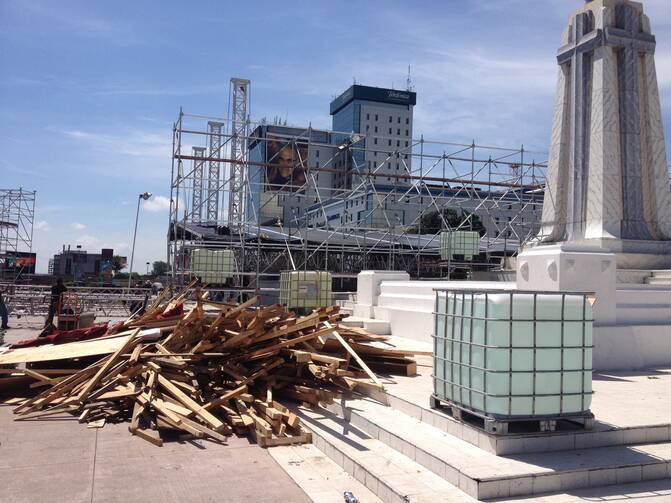The day after a city and a country celebrated the beatification of Oscar Romero, the city of San Salvador is quickly returning to normal, though here and some posters advertising the beatification ceremony have escaped the memorabilia-seekers--and the water-bags with Romero's likeness stamped on them are still everywhere, missing their precious cargo. And of course it will be a while before the Plaza Salvador del Mundo will look the same: there were crews out this morning at an early hour to begin the process of knocking down the huge pavilions contructed for the altar, for dignitaries, for Romero's friends and family, for medical facilities, and for the press.
So what now? What did it all mean? In theological terms, will the people of El Salvador receive the graces of what almost all agree was a graced moment? In social terms, will the country see a way beyond division and violence toward real reconciliation? In ecclesiological terms, is there a way to "be church" that does not include the shadow churches and the deep divisions that have marked both the episcopacy and religious practice?
"This beatification is for the Church," said Carmine Curci, the editor in chief of MISNA (Missionary Service News Agency, based in Rome), who lived in El Salvador in 1985/86, during the civil war, yesterday. "For the people there in the streets, for the people of El Salvador, Romero's was recognized as a saint many years ago."
The truth of his observation might best be seen in the fact that many attendees at Romero's beatification were wearing shirts in honor of San Romero. The people aren't waiting around for a Vatican congregation, in other words. What about daily life in El Salvador--how might it benefit from this beatification?
"I don't know what it will be, but the miracle we are asking for is peace," said one Salvadoran woman who asked not to be identified. "Our country has reached levels of violence that are ridiculous. You open the newspaper, and seventeen dead today, twenty three dead today, they massacred a family of five...whereas in the United States, they kill one person, it's all over CNN the whole day! Fourteen died on a truck here last week, and nobody knows... Violence has become our daily bread."
She was on her way next to mass--today is the Feast of Pentecost, the coming of the Holy Spirit.








